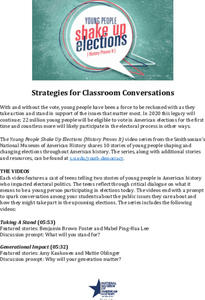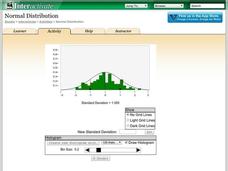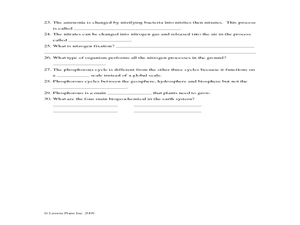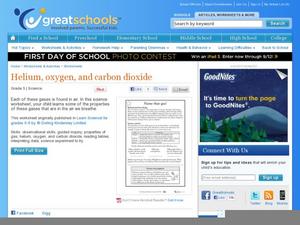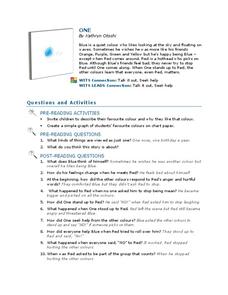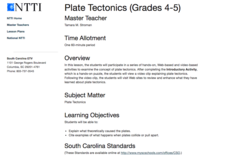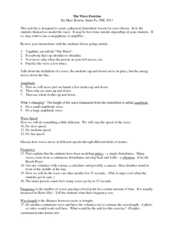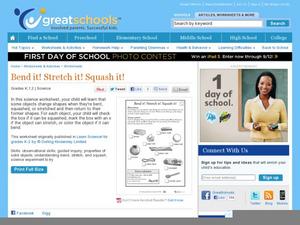Santa Monica College
Single and Double Displacement Reactions
If you aren't part of the solution, you are part of the precipitate! Young chemists learn about single and double displacement reactions including precipitation reactions, neutralization reactions, and gas forming reactions. They perform...
Smithsonian Institution
Young People Shake Up Elections (History Proves It) Educator Guide
Vote, it's your civic duty! The resource provides several videos about voting in the United States. Scholars watch a series of topics ranging from youth participation to civic action. The educator's guide provides teachers with...
Messenger Education
Cooling with Sunshades
Messenger's sun shade measures 8 ft x 6 ft and will have temperatures reaching 700 degree Fahrenheit on the outside while maintaining a cool 70 degrees underneath. In the third activity of four, groups discuss the basic properties of...
Shodor Education Foundation
Normal Distribution
Does the size of the bin matter? The resource allows pupils to explore the relationship between the normal curve and histograms. Learners view histograms compared to a normal curve with a set standard deviation. Using the interactive,...
Curated OER
Buying Cars/Financing Cars Compound Interest
Provide a real world context in which exponential functions are used to determine a eal world phenomena such as compound interest and exponential growth. This lesson should be taught after students have mastered the laws of exponents and...
Curated OER
Cartoons for the Classroom: Charisma vs. Experience
Which is more important for a president: experience or charisma? Scholars consider this as they analyze 2 political cartoons in this analysis handout. Background information gives context through a quote from The Telegraph, and 3 talking...
Curated OER
Look Out My Window. What Do You See?
Students explore William D. Huff's experience during Civil War as portrayed in his drawings, express empathy and demonstrate historical knowledge through creating their own artwork, and craft drawings and captions from perspectives of...
Curated OER
Why A Bill of Rights?
Examine conflicting viewpoints in this lesson, in which middle schoolers write their own proposal for including a Bill of Rights in the Constitution. As a class, they discover how the Bill of Rights was not a planned document to be...
Curated OER
Biogeochemical Cycles Study Guide
The four cycles in Earth's biogeochemical system are covered in this instructional activity. Science stars fill in the blanks or define vocabulary terms pertaining to the hydrologic, carbon, nitrogen, and phosphorous cycles. This...
Curated OER
Name That Gas!
Young scientists discover that air is a mixture of different gases - mainly nitrogen and oxygen. The properties of some of the other gases found in oxygen are listed in a table, then learners must decide which one of those gases is...
Curated OER
One
First graders listen to the story One and design a favorite color graph. In this language arts lesson, learners answer comprehension questions and discover the importance of standing up for a friend. They complete a worksheet about...
University of Chicago
Don't Be Too Flaky
Snow, ice, and water are all composed of H2O. Does that mean they all have the same volume? Discover the ways that the densities of these substances determine their volumes, and how they change based on their current states of matter....
Curated OER
Who Invented English Anyway?
In these English lesson plans, young scholars use video, the Internet and non-fiction essays to research the history of the English language. They write a short research paper and design a PowerPoint presentation showcasing their findings.
Curated OER
Energy At Play
If you can find Tinker Toys™, then this may be a fun assignment for your physical science class. Using the construction set and a few other toys, they examine the forces involved when it they are being played with. For each, they...
Curated OER
Those Fabulous Fables
A video leads off this activity on fables, introducing the class to this important form of traditional storytelling. The group defines fable and hears an explanation of the origin of this type of folk tale. They summarize the story they...
Curated OER
Plate Tectonics
Curious kids examine plate tectonics and give examples of their movement. They recognize how plates change the Earth through video, and web-based articles. In small groups, they receive complete a tectonics puzzle by silently switching...
Curated OER
Persuasive Writing - Anticipating Opposing Views
Persuasion, when used effectively, is a powerful and effective tool. In groups, young writers develop a persuasive letter about something that they would like their parents to allow them to do. Then, independently, they use proper...
Curated OER
Catch the Pollution
Explore environmental care by conducting a pollution experiment. You'll discuss the causes of pollution in our environment and what the overall impact will be if we can't change our ways. Clear plastic tape, a can, and compass are used...
Curated OER
Water Cycle Reading and Writing
Here is a great way to get pupils to express a scientific concept in a fun way. After hearing the story of Walter the Water drop and learning facts about the water cycle, the class will write a creative expository piece describing what...
The Science Spot
The Wave Exercise
During a lesson on wave motion, physical science participants basically act out the waves as a group. Through their movements, the amplitude, speed, frequency, and wavelength are all identified. Ideas for modeling the reflection and...
Curated OER
Choose the Homograph
Practice homographs with this fun worksheet! Learners choose the meanings of ten homographs based on the sentence's context clues. The worksheet has a picture of bats - one flying mammal, and one used in baseball. Use this resource as a...
Curated OER
Bend It! Stretch It! Squash It!
Some items keep their shape no matter what happens! Have your kindergarten class choose which items would stay the same if they were bent, stretched, or squashed. The last activity prompts kids to see what happens when they stretch a...
PBS
Lesson Plan: “Seeing the Way: A Brief History of Cataract Surgery”
After looking at the history of cataract surgery techniques, your high schoolers will have a new perspective on medical and scientific advances. Kids alternate between watching short video clips, class discussion, and computer research....
Using English
Emailing Functions Correction and Brainstorming
How do you address a large group of people? How would give someone bad news? How would you share happy news with a friend? Help your intermediate English language classes form these sentiments by providing them with this practice...
Other popular searches
- Chemical Changes in Matter
- Physical Changes in Matter
- Phase Changes in Matter
- Changes in Matter Activities
- Changes in Matter Water
- Changes in Matter Chemistry
- Matter Changes in State
- Changes in Matter/ Shadows
- Changes in Matter Presentation
- Changes in Matter Properities



